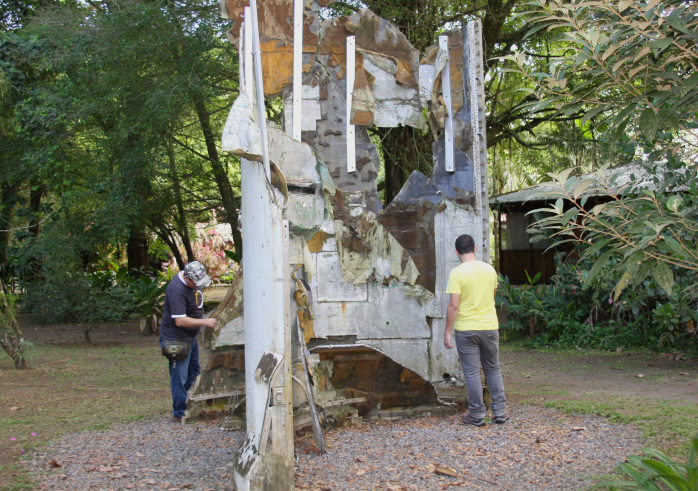We’ve written about Tortuguero, on the northern Caribbean coast, many, many times. The town and national park – one of Costa Rica’s top tourism destinations – have been the subject of articles by The Tico Times about everything from manatees to drug traffickers; from turtles to marauding criminal gangs killing innocent people left and right.
We’ve roamed the mangroves, swamps, beaches and hotels, visited with the locals and looked into the history. But we’ve never noticed a nexus between this wild outpost of Costa Rica in the remote northeastern corner of the country and space flight.
Until now.
As you can imagine, The Tico Times’ newsroom hears everything – from the invasion of African killer bees to the three-headed lizard. We’ve investigated whether there is a dearth of street cats in the vicinity of Chinese restaurants. Most of these stories aren’t worth more than a cursory look before we move on. But in all our 58 years, we have never heard of the remains of a bona fide rocket falling in a hotel’s backyard.
Until now.
We didn’t believe it, of course. So, full of skepticism, we boarded a plane, took a boat, and arrived at the Turtle Beach Lodge before 7:30 a.m., barely missing the daily raging rainstorm. We were greeted by Juancho, the caiman that makes its home in the lagoon at the hotel’s dock, and were escorted to see the famous rocket remains.
It’s easy to imagine the scene: Birds are screeching above, the howler and spider monkeys are continuing their ageless loud war of nasty howls, laughing children are running around the hotel pool, when, out of nowhere, completely unexpected and uninvited, a screaming, burning mass of rocket parts comes flaring out of the sky, landing with a loud thump.
Except that’s not exactly what happened.
The recent spate of spacecraft events seen on the news remarkably did not include the Costa Rican chapter. The Soyuz rocket that exploded upon launch in Virginia. The Virgin Galactic spacecraft Enterprise that failed with the tragic loss of a pilot. The impressive landing of a probe on a meteorite by the European Space Agency (ESA). What others missed was that the ESA also brought space flight to Tortuguero.
Cuban-born Frank Trapani, general manager of the lodge, figured it out.
The large pieces of aerospace debris were discovered on the beach one morning in March 2012. Trapani and his staff originally considered them to be pieces of a commercial airliner, but the honeycomb structure encased within aluminum suggested otherwise. Commandeering the hotel staff, with the help of a quad, they rescued the large metal pieces of something and took them to a clear space behind the restaurant. Then Trapani started his research, burning the midnight oil on the Internet.
The story emerged.
Once the airliner theory was discarded, considering that one probably would have heard of a disintegrating airliner over Central America, Trapani turned his attention to the markings and serial numbers on the debris.
What he found out still excites him. French Guiana is home to ESA’s Guiana Space Centre used by Arianespace. Russian-supplied Soyuz rockets power the launch vehicle for satellite delivery. Two early launches in 2011 were entirely successful, and the fairing systems that shielded the satellites behaved perfectly, sacrificing themselves, and delivering their charred remains ultimately to Trapani’s hotel beach.
Galileo Mission VS01 Oct. 21, 2011

The first launch of a Soyuz rocket from Kourou, French Guiana, carried two satellites that would form part of the European Galileo system, similar to the U.S. GPS system. The launch was delayed because of technical concerns, but took off at 10:30 without further problems, under a cloudy sky and light rain. The Soyuz ST-B rocket started its engines a few seconds before launch, performing flawlessly.
Four minutes after launch the fairing protecting the satellites was ejected. Three hours and 49 seconds after launch the satellites were successfully placed into orbit.
Galileo is the name of Europe’s Global Navigation Satellite System (GNSS), managed by civil authorities in Europe. It’s Europe’s answer to GPS and GLONASS, the Russian system.
Watch the launch of the Galileo mission here:
Pleiades Mission VS02 Dec. 17, 2011
This was the second successful launch from French Guiana using a Soyuz rocket.
This time the payload was high-resolution satellites that would form part of a system to support Chilean aviation. They were successfully placed in orbit three hours and 36 minutes after launch, at 2:29 local time.
The fairings from both rockets then fell somewhere in the ocean, only to wash up on the shores of the Turtle Beach Lodge, Tortuguero.
Of course, it’s pretty cool (and generous) of the French, Russians and Chileans to send their high-tech debris to Costa Rica. But one wonders, should we be constantly in fear of jettisoned rocket parts falling out of the sky? Did any foreign agency warn us that something of the kind might happen? Did they stand in line and seek permits for such an eventuality? Were there high-level governmental meetings? Were children warned to wear helmets? Was an environmental impact statement prepared?
Apparently not.
But we checked anyway. The National Technical Secretariat of the Environment Ministry sent us to the regular Environment Ministry. They sent us to the Health Ministry. None of them had heard of rocket landings. Apparently, Tortuguero, and Trapani’s Turtle Beach Lodge were just blessed. And if you want to fly (or drive), and take a boat, and brave Juancho, you too can see Costa Rica’s only Space Museum, and consider that we are part of man’s endeavor into space. Franklin Chang (Costa Rica’s astronaut) has apparently not accepted invitations to visit the museum… yet.
Related: Meet Sandra Cauffman, the Tica co-directing NASA’s current mission to Mars






